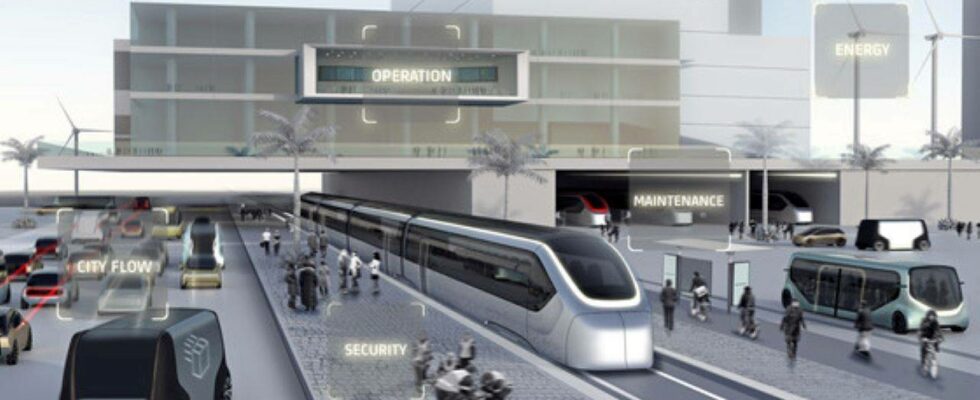(AOF) – Alstom will deliver 18 double-deck Coradia Max electric multiple units to DB Regio AG. The order includes nine three-car trainsets and nine five-car trainsets, which will be put into service during the changeover to winter timetables in December 2027 on the regional express line RE1 Hamburg – Rostock. This contract was registered in the third quarter of the 2023/24 fiscal year.
AOF – LEARN MORE
Key points
– World leader in rail transport, from trams and metros to TGVs, strengthened by the acquisition, in 2021, of Bombardier Transport;
– Activities of €15.5 billion at the end of the 2021-2022 financial year, 62% carried out in Europe, 17% in the Americas, 14% in Asia-Pacific and 7% in the rest of the world;
– Offer covering all rail construction professions: rolling stock for 56% of sales, signaling for 15%, systems for 7% and services (maintenance, remote control of vehicles, networks, passengers, etc.) for 22%;
– Business model based on:
– the complementarity of the geographical zones between Alstom -France, Italy, Spain, India, South-East Asia, North Africa and Brazil- and Bombardier Transportation -United Kingdom, Germany, Scandinavia, China and North America,
– the creation of value ranging from the design and construction of a rail system to maintenance;
– Open capital, 17.48% held by the Caisse de dépôt et placement du Québec, Henri Poupart-Lafarge, general manager, chairing the board of directors of 13 members;
– Solid balance sheet: €9 billion in equity and €4.6 billion in cash versus $2.3 billion in net debt.
Challenges
– Alstom in Motion 2024/25 growth strategy with confirmed objectives:
– annual increase of +5% in revenues, operating margin of 8 to 10% and industrial investments at 2% of revenues,
– 80% conversion of the result into free self-financing t,
– distribution to shareholders between 25 and 35%;
– Innovation strategy supported by R&D of 3.4% and 9,400 patents with 3 axes:
– complete range of green traction, powered by fuel cell technology and, soon, fully connected transport fleets,
– innovation ecosystems: industrial partnerships (Engie, DeutscheBann, etc.), with start-ups via the Aster fund, with suppliers via the Alliance program, participation in 30 European programs, including Shift2Rail, and, internally, entrepreneurship with I move you,
– deployment of the digital suite across 100% of the group;
– Environmental strategy for decarbonization of activity:
– integrated into the innovation strategy – eco-design of the main solutions from 2025, and aimed at strengthening natural capital – use of renewable electricity, revaluation of waste, recycling,
– aiming for a 10% reduction in energy intensity and a 25% reduction in CO2 emissions by 2025 (vs. 2019);
– eco-circularity: waste recovered at 98%,
– launch of the 1st green guarantee facility;
– Control of portfolio rotation – disposals forced by the merger with Bombardier and strengthening of holdings, particularly in Cylus, in Kazakhstan and South Africa;
– Good visibility, with order intake of 15.2 billion at the end of December, including 55% in Europe, or more than 1 year of revenue.
Challenges
– After the loss recorded in 2021-22 due to provisions linked to the acquisition of Bombardier Transport, execution of the synergies of the merger with Bombardier -€200 million in 2022/23, €400 million per year in 2024/25 and 475- €500 million thereafter – but positive impact on 2023 profit;
– Uncertainties over the outcome of the investigation into the February rail accident in Greece;
– Negative impacts of inflation on the 2022/23 margin but almost total control of component supplies;
– After an 8% increase in revenue over the first 9 months of the financial year, 2022-23 outlook confirmed for an operating margin of 5.1 to 5.3% and free self-financing between 100 and 300 M€.
Learn more about the Capital Goods sector
Rail investment plan
The French railway industry is in second place in Europe and third place worldwide. This industry displays a trade surplus, which generates more than 100,000 jobs in France. The announcement of the future plan for French rail transport provides in particular for the regeneration and modernization of the network, the average age of which is 30 years in our territory. This age is much higher than that of countries like Germany (17 years) and Switzerland (15 years). An annual investment increasing from 2.8 billion euros to nearly 4 billion euros should make it possible to maintain the entire network in good condition.
